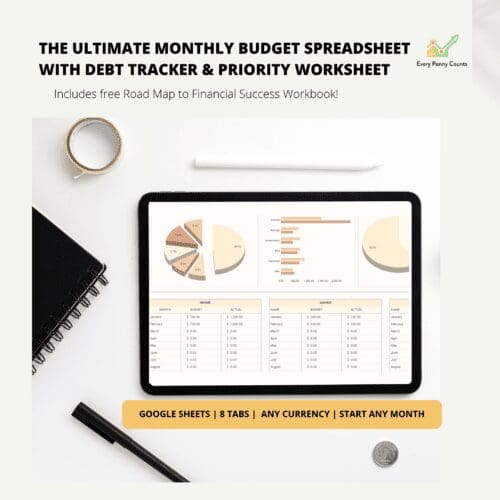
6 Ways to Manage Money Amid More Taxes & High Inflation
Are you always looking for ways to manage money better? I know this is something we are always doing in the quest for financial success. However, given the continued rise in basic goods prices, one must be extra vigilant in money management.
In addition to the high cost of living, we now have to deal with additional tax rates and levies. How does this affect you? Well, it lowers your disposable income, which is the amount of money you’re left with after the deduction of income taxes.
Difficult as things might seem, we’ve to persevere, right? So, let’s talk about how you can manage money during periods of high inflation and tax rates.
Key Tax Elements That Will Affect Your Disposable Income
The Finance Act 2023 is loaded with lots of heart-wrenching taxes for taxpayers. Let’s talk about these two key items;
The Housing Levy in Kenya
By now, you already know about the housing levy. It’s a new levy meant to alleviate affordable housing for Kenyans. It’s a 1.5% deduction from both the employee and the employer. The housing levy will be calculated off your gross salary, which includes your basic pay and regular allowances, like car housing and travel allowances.
If you’ve received your salary for August, when most employers have applied the new housing levy and backdated the deduction for July, I am sure you’ve noticed your net pay is lower than in previous months.
The Change in Tax Rate for Higher Salary Ranges
We’ve been used to a tax rate of 30% for anyone on the tax band of Ksh. 32,333 and above per month. However, the Finance Act 2023 has introduced some changes, including higher tax rates for those on higher tax bands.
If you earn Kshs. 500,000 – Kshs. 800,000 and over Kshs. 800,000 per month, your new tax rate will be 32.5% and 35%, respectively. This will reduce your net pay compared to when your income was subject to a tax rate of 30%. Subsequently, it will lower your disposable income, leaving you with less money to spend, save and invest.
Let’s Talk About Inflation
Simply put, inflation is the rise in prices of goods and services. The inflation rate is usually expressed as a percentage. It leads to reduced purchasing power, meaning the value of a currency unit affords you fewer goods or services.
Case in point: compare your house shopping for the beginning of the year with a current one, like Jan and Aug comparison. Spot the difference in prices and how Ksh. 1,000 currently buys you fewer items.
Every time I look at my shopping list, it gets disheartening. I am certain I am not the only one. According to CBK’s inflation rate data, the annual average inflation rate for the previous month, as of this article, July 2023, was 8.68%. While it might have dropped from June’s rate of 8.77%, honestly, I still don’t feel the difference. Plus, the rate is still higher than in July 2022, 6.45%.
While there are predictions inflation will stabilize, the likelihood is that prices of goods and services will still remain high.
How to Manage Money During High Taxes & Inflation Rates
1. Watch Your Spending
Maybe you’ve gotten tired of hearing this line. Every time anyone dishes out advice about how to manage money or anything to do with your personal finances, there’s bound to be a tip about lowering your expenses. Tiring, right?
Honestly, though, I am always looking for ways to lower my spending. In fact, I have become more vigilant under these new circumstances. From meal planning to buying items I only use, especially groceries, scouting for deals, and ignoring premium brand names. I have even started learning to bake (still a long way to go, LOL) and making desserts like Mahamri just to stop buying bread!
Anyway, as a quick reminder, here are ways you can reduce your spending;
- Buying in bulk
- Scouting for deals
- Eating homemade meals
- Create a meal plan – it ensures you only buy what you need
- You don’t have to shop for premium brands
- Look for affordable entertainment options, like staycations, picnics, and vacations to budget-friendly destinations if a vacation is necessary
- Growing groceries, even on your balcony
- Communicating more via WhatsApp messages/calls/videos to reduce your monthly airtime expense
- Cancel unused subscriptions
The good news is that I have got your back. If you don’t know expenses to cut down, I have monthly and annual budgeting spreadsheets (see the products below) that can help you do exactly that. The priority worksheet allows you to rank each expense category by order of importance. It’s an excellent way to evaluate your spending and see how much you save from cutting off some expenses.
2. Earn More Money
Just like minding your expenses, there are never-ending tips on how to make more money. Is it necessary to pay attention to these every time? Absolutely!
The truth is, you can only do too much with your expenses, especially with the rising cost of living. Increasing your earning potential is the next best thing.
The extra income can help you afford goods and services amid the rising prices, especially if there’s nothing more you can cut off from your expenses. Additionally, it will help you increase your savings and investments. Or even get you out of debt.
I have previously talked about some of the freelancing jobs you can consider, including top freelancing sites to use. I have talked about monetizing your hobbies for extra cash and pointed out some of the hobbies you can monetize.
What if you don’t want to venture into side hustles and freelance jobs? Well, that’s okay. If you recall, one of my previous takes on this is that side hustles are not a must for everyone, and there are other ways of making money from employment opportunities. Some of these include asking for a pay raise, better benefits, and getting a new job with better pay.
In addition to these, you can also increase your earning potential through investments. I will talk about these later in the article. So, keep reading!
3. Reevaluate Your Emergency Fund
Since the prices of goods are higher than before, I’d recommend reevaluating your emergency fund. Can your savings really cushion you comfortably, given the new price rates? Because prices are higher now, you might have to put extra funds into your emergency fund to ensure you can afford goods and services in this environment.
Remember that your emergency fund needs to cover at least 3 – 6 months of your living expenses. If possible, I’d even recommend making it 12 months, which is what I am aiming for to ensure better protection.
But you don’t have to put all your efforts into creating a fully-funded emergency fund, especially if you still have lots of debt. You can start with a quick start emergency fund, which allows you to have some savings for the basics. This will probably cover 1 – 2 months of your living expenses.
Next, ensure your emergency fund savings are earning you a return that counters the high inflation rates. Your current bank account is great for saving, thanks to its high liquidity. But your money is losing value and will not afford you the same basket of goods if inflation keeps soaring.
I’d recommend putting funds in Treasury-Bills, Money Market Funds (MMF), or a Sacco account. The interest returns have increased, ensuring the rising inflation rates are not eroding all your investment returns.
4. Invest. Invest. Invest!
Saving money is great. But it will not get you very far in building wealth and cushioning your finances, especially with the high inflation rates and reduced disposable income. For instance, the above recommended saving avenues are offering rates of 10% – 12% rates as of writing this article. The inflation rate is trailing right behind, leaving you with a real return of less than 4%.
However, investment assets will offer you a higher return. For example, government bonds are offering a return of 14%+. If you are an aggressive investor and opt for assets like shares and real estate, you might enjoy a higher return in the long run. That means your investment returns will beat inflation, allowing you to earn a higher real return. This is an excellent way to earn passive income through dividends and interest returns.
Additionally, you can make money from capital appreciation of these assets. Having said this, keep in mind that these types of investment assets only offer lucrative capital returns when held for extended periods. If you can hold these for 3+ years or 5 years at the bare minimum, you are likely to enjoy a better capital return.
For this to work, I recommend diversifying your investment portfolio. Even if you choose to invest in bonds only, invest in different bonds and try to time the interest repayments so that you receive payments on several months of the year. We call this bond layering. However, I’d also recommend more diversification with other asset classes, like mutual funds and REITS, for the risk-averse.

5. Rethink Your Borrowing Needs
One of my goals for the year was to get a loan to buy some assets during the first half of the year. But, I had to rethink this stance, considering the market conditions that led to increased interest rates. Sad as it was, I was happy to postpone this goal.
With the reduced disposable income and high inflation, it makes sense to rethink your borrowing needs. Only borrow money if it is absolutely necessary. That includes your credit cards and mobile loans.
This is where being vigilant with your spending comes in handy. With reduced spending, you can use the saved-up cash to meet some of your needs, as long as they are not capital-intensive. If you have some planned capital-intensive projects, e.g., purchasing land, constructing, or buying a new car, you can postpone and continue building up savings for this goal.
6. Investing In Yourself
There’s no better way to proof your finances than investing in yourself. By this, I mean preparing yourself for future opportunities. This is even more important if one of your survival strategies is getting better employment opportunities. Or hope to acquire a new skill to help you have a side hustle or start freelancing.
I know that the high inflation rates and the reduced disposable income are a roadblock. However, not all learning opportunities are cash-intensive. Some online courses are free, and others are affordable compared to university and college certifications. Others use sites like YouTube to learn skills that they later monetize. For Instance, when I wanted to launch a budgeting book, I used YouTube to learn Indesign. Which I did, and designed the inner pages and content of my EPC Budget Book Planner.
The Bottom Line
You cannot control events like inflation and increased taxation. What you can do, though, is take the necessary measures to proof your finances. This starts with controlling your spending, saving, and earning potential. That includes reducing your expenses, saving more money instead of holding cash, investing to earn more and beat inflation, and reducing your debt and future borrowing plans.








